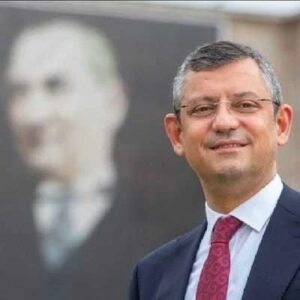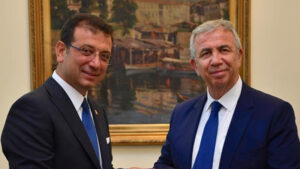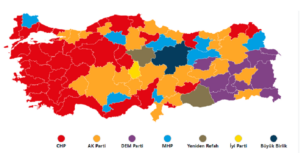Turkish people went to ballots yesterday (31 March 2024) to set the municipal leaders of 30 metropolitan cities, 51 cities, and hundreds of districts/counties. As citizens of a country known for the highest election participation turnout rate, Turkish people again showed their devotion to democratic processes by participating in local elections around 78.53 %. Although official results are not declared by the Turkish Supreme Election Board (YSK), results coming from political parties and media institutions[1] give us a clear enough picture of the political consequences.
| Political Party | Total Votes (%) |
| CHP | 37.74 |
| AK Parti | 35.49 |
| YRP | 6.19 |
| DEM | 5.68 |
| MHP | 4.98 |
| İYİ Parti | 3.77 |
| ZP | 1.73 |
| SP | 1.09 |
| Hüdapar | 0.55 |
| BBP | 0.44 |
| DEVA | 0.33 |
Political parties’ total votes
Here are the striking features of these local elections:
1. The shocking development is that the pro-secular CHP became the leading party in the country in these elections with 37.74 % of the votes and Türkiye’s governing Islamist-conservative AK Parti (2002) took only 35.49 %. In that sense, CHP showed its true potential to rule Türkiye in the next presidential election (normally scheduled for 2028) in which Türkiye’s long-serving (2014-) President Recep Tayyip Erdoğan might not be eligible to run unless the Turkish parliament (TBMM) decides for early elections or the current Turkish constitution is amended for allowing a President to serve more than two terms. AK Parti and Turkish nationalist MHP’s combined votes as part of People’s Alliance (Cumhur İttifakı) on the other hand make around 40.5 %, a fact showing that the ruling right-wing bloc is still strong.

President Erdoğan had the biggest defeat of his political career
2. Among other political parties, the Islamist New Welfare Party (YRP) took 6.19 %, pro-Kurdish DEM Party took 5.68 %, Turkish nationalist MHP took 4.98 %, pro-secular nationalist İYİ Parti took 3.77 %, anti-immigrant ultranationalist Victory Party (ZP) took 1.73 %, Islamist Felicity Party (SP) took 1.09 %, pro-Kurdish Islamist Hüdapar took 0.55 %, Islamist-Turkish nationalist Great Unity Party (BBP) took 0.44 %, and liberal-conservative DEVA Party took 0.33 %.
3. CHP won the metropolitan municipalities of the five biggest cities; İstanbul, Ankara, İzmir, Bursa, and Antalya, and proved its strength and popularity in urbanized and developed regions of the country. In that sense, CHP’s young leader/chair Özgür Özel proved himself to be a good leader in terms of electoral strategy and finding good candidates and guaranteed to keep his seat after the elections. Özel made CHP the leading party of the country since the 1977 general elections and made the left the leading ideology since the 1989 local elections and the 1999 general elections.

Özgür Özel
4. CHP’s victorious municipal leaders in Ankara and İstanbul, Mansur Yavaş (Ankara) and especially Ekrem İmamoğlu (İstanbul) became automatically favorite presidential candidates for the opposition for the next election. Some political commentators already point out Ekrem İmamoğlu as the favorite presidential candidate for the next election.

Ekrem İmamoğlu and Mansur Yavaş
5. Among 30 metropolitan cities, CHP won 14, AK Parti won 12, and DEM Party 3, and YRP 1 municipalities.
6. In total, pro-secular CHP won in 35 cities[2], the Islamist-conservative AK Parti won the race in 24 cities[3], the pro-Kurdish DEM Party in 10 cities[4], the Turkish nationalist MHP in 8 cities[5], the Islamist YRP (New Welfare Party) in two cities (Şanlıurfa and Yozgat), the pro-secular nationalist İYİ Parti in one city (Nevşehir), and the Islamist-nationalist BPP in one city (Sivas).
7. In total, AK Parti won the competition in 356 districts, CHP in 337 districts, MHP in 122 districts, DEM Party in 65 districts, YRP in 39 districts, İYİ Parti in 24 districts, BBP in 14 districts, and people from small parties and independents in 16 districts. These statistics prove that right-wing parties perform better in districts and more rural areas.
8. The Pro-Kurdish DEM Party showed its power in densely Kurdish-populated southeastern Anatolian cities and won in 10 cities (3 metropolitan cities: Diyarbakır, Mardin, and Van) and 65 districts. In that sense, the DEM Party has evolved into a strong regional party similar to the Scottish National Party (SNP) in Britain.
9. A new Islamist political party coming from Necmettin Erbakan’s National Outlook (Milli Görüş) tradition and led by Erbakan’s son Fatih Erbakan Islamist New Welfare Party (YRP) made an important bounce/gain in the ballots. YRP took more than 6 % and became a new and important political actor in Turkish political life. We can conclude that YRP is now a mainstream political actor with 6 % support achieved only in a few years. In that sense, President Erdoğan and his team made a grave political mistake by not convincing YRP to support the People’s Alliance (Cumhur İttifakı) in these elections.
10. It seems like Turkish people showed their negative reaction to the Erdoğan government and his far-right electoral coalition People’s Alliance (Cumhur İttifakı) in these elections by increasingly voting for alternative parties. The main reason for this is for sure the hyperinflation and related economic problems in the country in the last two years. Moreover, due to the low retirement payment policy of the government, retired and old people also extensively voted against AK Parti.

The electoral map of Türkiye has evolved into “red” this time with CHP gaining power in Western Anatolian cities
To conclude, the 2024 Turkish local elections showed that the democratic regime survives in Türkiye despite President Erdoğan’s successful authoritarian-leaning populist regime. In that sense, the social democratic and pro-secular CHP has the greatest potential to become a party that could lead the opposition in Türkiye despite its relatively weak position in conservative-nationalist Anatolian cities and densely Kurdish populated regions. CHP, from now on should start working on transforming itself into a modern catch-all party similar to AK Parti and embrace the voters from the right-wing and Kurdish politics as well. CHP should not conclude that the vote level they reach in these elections represents their true vote. The success of the party is based on the extraordinary popularity and success of some of its candidates (İmamoğlu and Yavaş) as well as people’s anger towards the government due to increasing economic problems.
Last word, after a long period of Erdoğan, it seems like the golden years of Ekrem İmamoğlu in Turkish politics could start soon and he might become Türkiye’s 13th President in the coming years. That is why; a popular call for early elections (presidential and parliamentary elections) is also a possibility now in Turkish political life. President Erdoğan on the other hand from now on will focus on fixing the economy, expanding his electoral bloc by trying to convince other groups (YRP and Kurds), and trying to plan his third term or choosing his successor to lead the right-wing bloc. Erdoğan and the People’s Alliance still have a considerable chance since the total of the right-wing bloc exceeds 50 %. Erdoğan accepted the defeat and promised rejuvenation within his party, a fact that shows his democratic approach to politics.
Assoc. Prof. Ozan ÖRMECİ
[1] Some sources used in this paper are:
- https://secim.aa.com.tr/ (Anatolian Agency/AA),
- https://secim.ntv.com.tr/ (NTV).
[2] Adana, Adıyaman, Afyonkarahisar, Amasya, Ankara, Antalya, Ardahan, Artvin, Aydın, Balıkesir, Bartın, Bilecik, Bolu, Burdur, Bursa, Çanakkale, Denizli, Edirne, Eskişehir, Giresun, İstanbul, İzmir, Kastamonu, Kırıkkale, Kırşehir, Kilis, Kütahya, Manisa, Mersin, Muğla, Sinop, Tekirdağ, Uşak, Yalova, Zonguldak.
[3] Aksaray, Bayburt, Bingöl, Bitlis, Çorum, Düzce, Elazığ, Erzurum, Gaziantep, Hatay, Isparta, Kahramanmaraş, Karabük, Kayseri, Kocaeli, Konya, Malatya, Niğde, Ordu, Rize, Sakarya, Samsun, Şırnak, Trabzon.
[4] Ağrı, Batman, Diyarbakır, Hakkari, Iğdır, Mardin, Muş, Siirt, Tunceli, Van.
[5] Çankırı, Erzincan, Gümüşhane, Karaman, Kars, Kırklareli, Osmaniye, Tokat.



















































